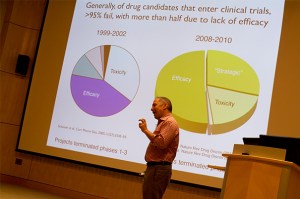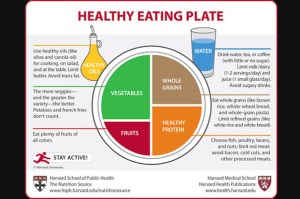Tag: Type 2 Diabetes
-
Health
Bad for all, sugary drinks may raise early death risk for Type 2 diabetics
Large-scale study finds sugar-sweetened beverages linked with increased risk of cardiovascular disease and premature death for people with Type 2 diabetes.

-
Health
Low-carb diet can help manage progression of Type 2 diabetes
A Harvard study found that a plant-based low-carbohydrate diet was tied to a reduction in overall, cardiovascular, and cancer mortality among people with Type 2 diabetes.

-
Health
Diabetes drugs may reduce cardiovascular deaths
Drugs originally developed for the treatment of Type 2 diabetes were found to reduce cardiovascular deaths and heart failure events among patients.

-
Health
Genetic risk scores developed for six diseases
Newly developed polygenic risk scores, which add up hundreds or thousands of genetic risk factors for six common diseases, can aid physicians and patients in making individualized disease screening and prevention decisions.

-
Health
This is your body on carbs, in real time
By studying how cells from healthy normal weight and overweight participants broke down carbohydrates in real time, researchers have found clues about what triggers metabolic distress.

-
Health
Exercise: It’s all about timing
Based on observational data, it was found that the timing of daily physical activity was linked to fitness levels and cardiovascular risks in men with Type 2 diabetes.

-
Health
Plant-based diet may feed key gut microbes
A large-scale international study uses metagenomics and blood analysis to uncover gut microbes associated with the risks for common illnesses such as diabetes, obesity, and heart disease.

-
Science & Tech
Backbone of success
Harvard researchers have unveiled the first stem cell models of human spine development, setting the stage for better understanding of musculoskeletal and metabolic disorders, including congenital scoliosis, muscular dystrophy, and Type 2 diabetes.

-
Science & Tech
Pancreas on a chip
Islet-on-a-chip technology allows clinicians to easily determine the therapeutic value of beta cells for any given patient.

-
Health
Growing support for plant-based diet
A new meta-analysis shows that people who follow predominantly plant-based diets with greater adherence have a 23 percent lower risk of developing Type 2 diabetes than those who follow these diets with lower adherence.

-
Health
Hold the soda, hold the fat shaming
Health and policy expert Sara Bleich has found that when trying to change the way people eat, being prescriptive isn’t always the answer.

-
Health
Untangling the connection
Harvard Medical School researchers have found that impaired insulin signaling in the brain negatively affects cognition, mood, and metabolism, all components of Alzheimer’s disease.

-
Science & Tech
New test helps ID those at risk for five deadly diseases
A Harvard research team developed an analysis to measure millions of small genetic variations and calculate the risk of developing five serious common diseases: coronary artery disease, atrial fibrillation, Type 2 diabetes, inflammatory bowel disease, or breast cancer.

-
Work & Economy
Graphic images speak to consumers of sugary drinks
In Harvard studies, one of which tracked more than 20,000 beverage sales, graphic warning labels were linked to reduced sugary drink purchases.

-
Health
Giant leap against diabetes
Harvard stem cell researchers announced a giant leap forward in the quest to find a truly effective treatment for type 1 diabetes, a disease that affects an estimated 3 million Americans.

-
Health
‘Broken genes’ for a broken system
To David Altshuler, the recent discovery of a genetic mutation that protects against type 2 diabetes offers hope in fighting more than just diabetes. It also illustrates how using the…

-
Health
Major step in preventing type 2 diabetes
Researchers at the Broad Institute and Massachusetts General Hospital, both Harvard affiliates, have identified mutations in a gene that can reduce the risk of individuals developing type 2 diabetes. If a drug can be developed that mimics the protective effect of these mutations, it could open up new ways of preventing this devastating disease.

-
Health
Neanderthals’ DNA legacy linked to modern ailments
Remnants of Neanderthal DNA in modern humans are associated with genes affecting type 2 diabetes, Crohn’s disease, lupus, biliary cirrhosis, and smoking behavior. They also concentrate in genes that influence skin and hair characteristics. At the same time, Neanderthal DNA is conspicuously low in regions of the X chromosome and testes-specific genes.

-
Health
Nut consumption reduces risk of death
In the largest study of its kind, people who ate a daily handful of nuts were found to be 20 percent less likely to die from any cause over a 30-year period than those who didn’t consume nuts, say Harvard researchers.

-
Health
Skip the juice, go for whole fruit
Harvard researchers have found that people who ate at least two servings each week of certain whole fruits — particularly blueberries, grapes, and apples — reduced their risk for type 2 diabetes by as much as 23 percent in comparison to those who ate less than one serving per month.

-
Health
Potential diabetes breakthrough
Researchers at the Harvard Stem Cell Institute have discovered a hormone that holds promise for a dramatically more effective treatment of type 2 diabetes, a metabolic illness afflicting an estimated 26 million Americans.

-
Health
Health in the balance
In research, treatment, and outreach, researchers from Harvard Medical School are taking on the childhood obesity epidemic in the United States. This is the first in a three-part series.

-
Health
The future of self-knowledge
Anne Wojcicki, chief executive officer and co-founder of 23andMe, talked about growth in personal genomics in an event sponsored by the Program on Science, Technology and Society.

-
Health
Red meat raises red flags
A new study by Harvard School of Public Health researchers has found that red meat consumption is associated with an increased risk of total, cardiovascular, and cancer mortality.

-
Health
Obesity? Diabetes? We’ve been set up
The twin epidemics of obesity and its cousin, diabetes, have been the target of numerous studies at Harvard and its affiliated hospitals and institutions. Harvard researchers have produced a dizzying array of findings on the often related problems.

-
Health
Harvard serves up its own ‘Plate’
The Healthy Eating Plate, a visual guide that provides a blueprint for eating a healthy meal, was unveiled today by Harvard nutrition experts.

-
Health
Advances in type 2 diabetes drugs
Researchers from Harvard-affiliated Dana-Farber Cancer Institute and the Scripps Research Institute in Jupiter, Fla., report they have created prototype drugs having powerful anti-diabetic effects, yet apparently free — at least in mice — of dangerous side effects plaguing some current diabetes medications.

-
Health
Tax on sugary drinks?
The global obesity epidemic has been escalating for decades, yet long-term prevention efforts have barely begun and are inadequate, according to a new paper from international public health experts published in the Aug. 25 issue of the journal The Lancet.

-
Health
Risky eating
A new study by Harvard School of Public Health researchers finds a strong association between the consumption of red meat — particularly when the meat is processed — and an increased risk of type 2 diabetes.




